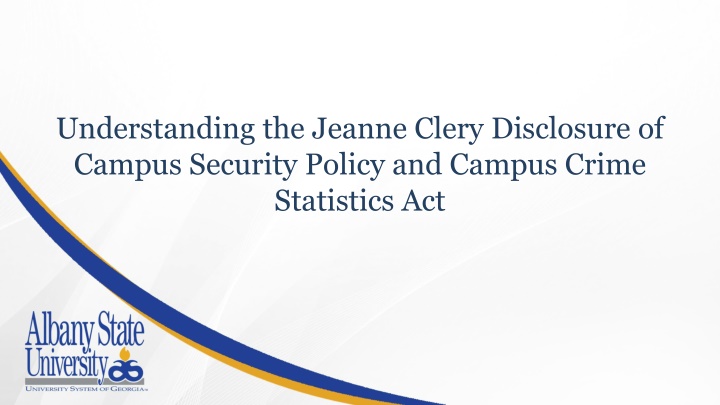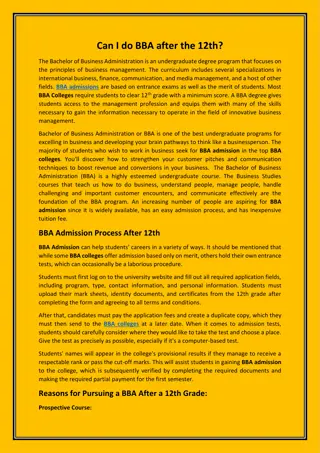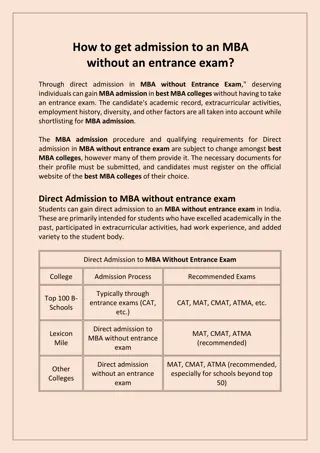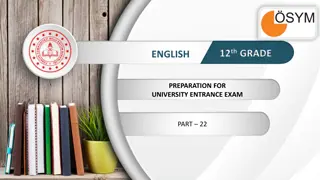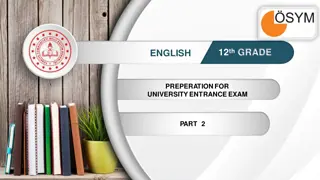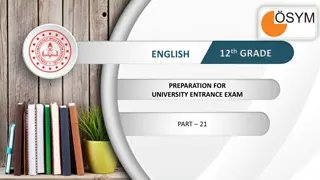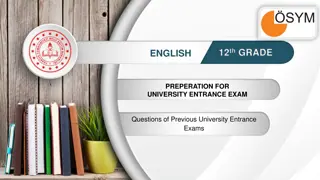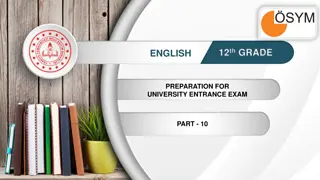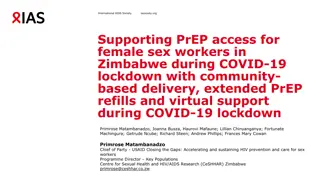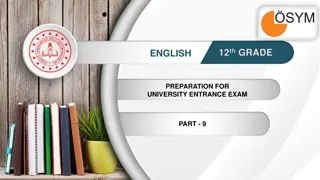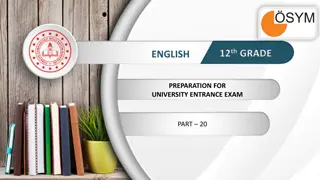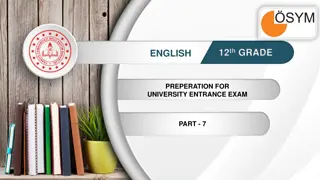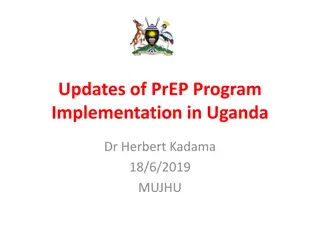12th Grade English Exam Prep for University Entrance
In this English preparation material for the university entrance exam, you will find exercises where you have to identify the closest English sentences in meaning to the given Turkish sentences. Topics include safeguarding island nations from rising sea levels, causes of air pollution, effects of declining birth rates and aging populations in rich countries, and the historical significance of Pergamum in western Anatolia. Improve your comprehension and translation skills with these practice questions.
Download Presentation

Please find below an Image/Link to download the presentation.
The content on the website is provided AS IS for your information and personal use only. It may not be sold, licensed, or shared on other websites without obtaining consent from the author.If you encounter any issues during the download, it is possible that the publisher has removed the file from their server.
You are allowed to download the files provided on this website for personal or commercial use, subject to the condition that they are used lawfully. All files are the property of their respective owners.
The content on the website is provided AS IS for your information and personal use only. It may not be sold, licensed, or shared on other websites without obtaining consent from the author.
E N D
Presentation Transcript
Understanding the Jeanne Clery Disclosure of Campus Security Policy and Campus Crime Statistics Act
What is the Clery Act? The Jeanne Clery Disclosure of Campus Security Policy and Campus Crime Statistics Act (The Clery Act) is named after Jeanne Clery, a 19- year-old Lehigh University student who was raped and murdered in her campus residence hall in 1986. Her murder triggered a backlash against unreported crime on campuses across the country. The school had failed to inform students about the 38 violent crimes on campus in the 3 years preceding her murder. Her parents argued that, had the university's crime record been known, Jeanne would not have attended. The Clery Act is a consumer protection law that aims to provide transparency around campus crime policy and statistics. It requires colleges and universities to report campus crime data, support victims of violence, and publicly outline the policies and procedures they have put into place to improve campus safety. The Clery Act requirements provide students and their families with accurate, complete, and timely information about crime statistics and campus safety so that they can make informed decisions about their college experience.
What are the Universitys Responsibilities? The Jeanne Clery Disclosure of Campus Security Policy and Campus Crime Statistics Act (or Clery Act) is a federal statute codified at 20 U.S.C. 1092 (f), with implementing regulations in the U.S. Code of Federal Regulations at 34 CFR 668.46. The Clery Act requires institutions of higher education participating in Title IV student aid programs to disclose information about certain crimes, emergencies, and various safety-related policies with the goal of enhancing campus safety. Collect, classify, and count crimes reported to the campus police, local law enforcement, and Campus Security Authorities Issue emergency notifications and timely warnings Identify Campus Security Authorities Publish an annual security report with campus security policies and crime statistics Submit crime statistics to the Department of Education.
Albany State University is committed to providing a safe and secure environment for all members of the campus community. In accordance with the Clery Act, we publish statistical information regarding criminal or alleged criminal activity that is reported to the University and surrounding agencies, the arrest and referrals for disciplinary action statistics, on campus residential fire statistics, and the Annual Security and Fire Safety Report. Ongoing Disclosures include: Daily Crime Log: The Albany State University Police department maintains a public log of all crimes reported to University Police that occurred at any property owned, leased or rented by the University or within 500 yards of that property or within granted patrol jurisdiction. The Daily Crime Log includes the nature, date, time, general location, and disposition of each reported crime. All entries must be added to the Daily Crime Log within two business days of the report. The log will be made available for public inspection via the Albany State University website and at the University Police department during regular business hours. Timely Warnings: the Albany State University Police department will issue Timely Warnings, as soon as the pertinent information is available, for any Clery Act crimes that the University determines represent an ongoing threat to the safety of students, employees or the University Community. Emergency Notifications: the Albany State University Police department will, without delay, and considering the safety of the community, issue an Emergency Notification upon the confirmation of a significant emergency or dangerous situation involving an immediate threat to the health or safety of students, employees or University Community. Update your contact information to ensure you receive alerts from the Connect 5 Notification System.
Albany State University is required to submit the Clery crime statistics to the U.S Department of Education. An annual survey is conducted by the U.S Department of Education known as the Campus Safety and Security Survey. This web- based survey is used to collect the statistical data published in the Annual Security and Fire Safety Report. Albany State University will produce an Annual Security and Fire Safety Report by October 1 that contains a summary of campus security policies and specific crime statistics. Albany State University must provide a notice to all enrolled students and current employees that includes a statement of the report s availability, description of the contents, exact URL where the report is posted and how to obtain a printed copy of the report. Albany State University must provide a notice to prospective students and prospective employees that includes a statement of the report s availability, description of the contents, exact URL where the report is posted and how to obtain a printed copy of the report. To review the Annual Security and Fire Safety Report: https://www.asurams.edu/fiscal-affairs/police/stats-reports- logs/index.php
Collecting Crime Statistics What are Clery Reportable Crimes? Clery reportable crimes statistics include those offenses reported to the Albany State University Police Department, local law enforcement agencies, and designated Campus Security Authorities. The Clery Reportable Crimes include: Murder/Non-Negligent Manslaughter Manslaughter by Negligence Rape Statutory Rape Incest Robbery Aggravated Assault Burglary Motor Vehicle Theft Arson Hate Crimes
Collecting Crime Statistics What are Hate Crimes: A hate crime is not a separate, distinct crime, but is the commission of a criminal offense which was motivated by the offender s bias. If the facts of the case indicate that the offender was motivated to commit the offense because of his/her bias against the victim s perceived race; gender; gender identity; religion; sexual orientation; ethnicity; national origin or disability, the crime is classified as a hate crime. Hate Crimes include any Clery Act Criminal Offence or Larceny-Theft Simple Assault Intimidation Destruction of/Damage to/Vandalism of Property Categories of bias include race, gender, gender identity, national origin, religion, sexual orientation, ethnicity, or disability.
Disciplinary Action Referrals and Arrests In addition to the Clery reportable crimes, the Clery Act requires institutions to collect statistics for violations of state law and/or ordinances for drug, alcohol, and weapons violations. These violations can result in an arrest or disciplinary action. Institutions are required to disclose statistics regarding Disciplinary Action Referrals and Arrests for the following violations: Liquor Law Violations Drug/Narcotic Violations Weapon Law Violations
Violence Against Women Act The Violence Against Women Act (VAWA) amendments to the Clery Act expand the rights afforded to campus survivors of sexual assault, domestic violence, dating violence, and stalking. Colleges and universities must include statistical data regarding incidents of VAWA Crimes. For Clery reporting purposes these crimes are defined as: Domestic Violence: violence committed by a person who is a current or former spouse or intimate partner of the victim, is cohabitating, or has cohabitated, with the victim or shares a child in common with the victim. Dating Violence: violence committed by a person who is or has been in a social relationship of a romantic or intimate nature with the victim. Stalking: engaging in a course of conduct directed at a specific person that would cause a reasonable person to fear for his or her safety or the safety of others; or suffer substantial emotional distress.
The Clery Geography Clery Geography is the geographic area for which Albany State University is responsible for disclosing crime statistics. The following areas describe Albany State University s Clery Geography: On-Campus Residential: Inside residential halls. On-Campus: Everywhere else on campus. Non-Campus: Buildings or property owned and/or controlled by Albany State University that is used in direct support of/in relation to educational purposes, is frequently used by students and is not within the same reasonably contiguous geographic area of the university. Public Property: Property that is within, or immediately adjacent to, and accessible from the campus.
Other Locations Defined Please note: The term "off campus" typically evokes thoughts of private residences, apartments, houses, shopping centers, or bars. In the absence of a formal agreement for control between the institution and such spaces, these locations usually do not fall within the established Clery Geography categories. Consequently, incidents occurring in these places would not contribute to Clery crime statistics. An important distinction exists in the form of the "non-campus geography category. Non-campus geography pertains to buildings or property owned or controlled by the institution that are not reasonably contiguous to an on-campus building or property, yet still frequently used by students and used for educational purposes. This geography also includes property owned or controlled by student organizations officially recognized by the institution, such as Greek life or athletic teams. Albany State University has no officially recognized non-campus student organizations or student housing facilities.
Foreign Locations Situation: Clery Requirements: Albany State University opens and operates a campus in another country. Must report. No Clery reporting obligations. Students go abroad for credit in a program not run by Albany State University. Albany State University runs an international program contracts with an international entity to provide services and/or space. Must report if Albany State University owns or controls (e.g., leases) international property.
Timely Warnings and Emergency Notifications The Clery Act requires Albany State University to alert the campus community to certain crimes in a manner that is timely and will aid in the prevention of similar crimes. Timely Warning: In the event that a Clery Reportable Crime occurs, campus officials are required to evaluate if there is a serious or ongoing threat to the campus community to determine if a timely warning needs to be issued to all staff and students. Emergency Notification: In the event of an immediate, significant danger to the health or safety campus community (e.g. weather, disease outbreak), campus officials may issue an emergency notification. This notification can include the entire campus, or be limited to a specific area deemed to be at risk. Download the LiveSafe App and Update your contact information to ensure you receive alerts from Albany State University Police Department:
Identifying Campus Security Authorities What is a Campus Security Authority? The Clery Act defines a "Campus Security Authority (CSA) as an individual that falls within four different functional areas at a college or university to whom reports of Clery crimes occurring within Clery geography should be made. They are responsible for reporting crime information to the Campus Police Department. The Campus Security Authority is defined as being responsible for one or more of the following functions at an institution of higher education: Campus police department Any individual or individuals who have responsibility for campus security but who do not constitute a campus police department or a campus security department Any individual or organization specified in an institution s statement of campus security policy as an individual or organization to which students and employees should report criminal offenses. An official of an institution who has significant responsibility for student and campus activities, including, but not limited to, student housing, student discipline and campus judicial proceedings. An official is defined as any person who has the authority and the duty to take action or respond to particular issues on behalf of the institution.
The Campus Security Authority Examples of Campus Security Authorities: Deans Student Housing Staff Athletic Coaches Student Activities Coordinators Greek Life Officials who oversee a student center Student judicial officers Resident Advisors (RAs) Student advisors Faculty advisors to student organizations The intent of including non-law enforcement personnel in the Campus Security Authority role is to acknowledge that some community members and students in particular may be hesitant about reporting crimes, especially sexual violence, to the police. Because of this, victims of crime may turn to a trusted ASU employee for help and advice.
CSA Reporting Exemptions Examples of individuals who would not meet the criteria for a CSA include: Professional and Pastoral Counselors Clerical or cafeteria staff. Faculty member who does not have any responsibility for student and campus activity beyond the classroom. Although licensed mental health professionals and pastoral counselors are exempt from Clery Act requirements, the University encourages such counselors to tell victims about the Confidential Reporting Process, if, in their judgment, it is appropriate to discuss crime reporting with this client.
What to Do - Overview If someone reports a crime to you Get the facts: Who, What crime, When, Where, How, etc. Immediately report all Clery Act crimes to ASU PD so the campus can comply with timely warning policies and maintain accurate crime statistics for the Annual Security Report. Inform victims of their options, including confidential reporting and offering referrals to resources (e.g., campus assistance programs or a counseling or advocacy service, if appropriate). As a CSA, you DO NOT have to report the following: A crime that occurred before the victim came to Albany State University. A crime that occurred while the victim was away from campus and not involved in an Albany State University activity (e.g., at home during break).
What to Do Reporting to ASU PD Under the Clery Act, crimes are considered reported when they are brought to the attention of a Campus Security Authority (CSA) or local law enforcement agency. For CSAs, crimes are considered reported when they receive information about qualifying crimes from victims, witnesses, or other individuals with knowledge of the incident. CSAs must then document the details of the crime and report it to the Albany State University Police Department in a timely manner, generally within 24 hours of becoming aware of the incident. Regardless of your status (CSA or non-CSA), all campus community members are encouraged to promptly report all campus related criminal incidents and other public safety emergencies to Albany State University Police by calling 229-430-4711.
The inclusion of non-law enforcement personnel in the Campus Security Authority (CSA) role acknowledges the reality that some individuals, particularly students, may feel reluctant to report crimes, especially sensitive or personal ones such as sexual violence, to the police directly. This approach recognizes the importance of creating a supportive and accessible reporting environment where individuals feel empowered to come forward with information about crimes or safety concerns without fear of judgment, stigma, or retaliation. CSAs can serve as trusted points of contact for individuals who may prefer to report incidents to someone within the campus community rather than directly to law enforcement. Ultimately, the inclusion of non-law enforcement personnel helps facilitate a more inclusive and supportive reporting process, promotes trust and transparency within the campus community, and ensures that all individuals have access to the resources and support they need to address safety issues effectively.
Resources for CSAs Albany State University Police Department https://www.asurams.edu/fiscal-affairs/police/index.php Annual Safety and Fire Report https://www.asurams.edu/fiscal-affairs/police/stats-reports-logs/index.php The ASU PD CSA Incident Report Form https://www.asurams.edu/fiscal- affairs/police/The%20ASU%20PD%20CSA%20Incident%20Report%20Form.pdf Campus Security Authority https://www.asurams.edu/fiscal-affairs/police/campussecurityauthority.php
